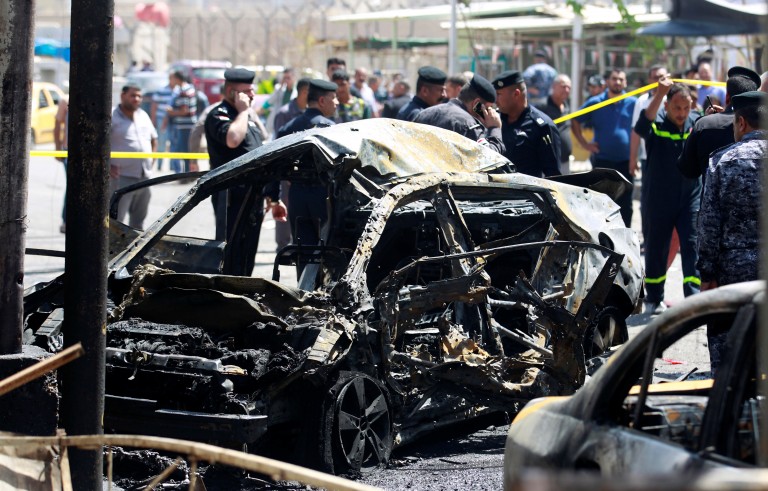JUDY WOODRUFF: But first: Twin bombings rocked Baghdad early this morning, just days after the beginning of the Muslim holy month of Ramadan.
Jeffrey Brown has more.
JEFFREY BROWN: The first attack hit a popular ice cream parlor in the Karrada district of the capital just after midnight. A suicide bomber struck as families milled about following their breaking of the fast. At least 15 people were killed, and nearly twice as many were wounded. ISIS has claimed responsibility.
The second attack came during the morning rush hour in a central district of Baghdad. A car bomb there killed at least 14 and wounded more than 30, all this as Iraqi forces, backed by U.S. and coalition airstrikes, press the offensive on Mosul, the last major ISIS foothold in Iraq.
We turn to Susannah George of the Associated Press in Baghdad.
Susannah, thank you for joining us.
So, these attacks are clearly targeting places where many are gathered, right? What can you tell us about the bombings?
SUSANNAH GEORGE, Associated Press: In the aftermath of the bombings, there was a lot of anger. Some of that anger was to the militants that carried out the bombings, that deliberately targeted targets where there were children and families.
But there was a lot of anger at Iraq's political leadership, who many Iraqis hold responsible for the security failings that allowed these bombs to get into Central Baghdad. This is not the first time that we have seen these large-scale bombings during Ramadan.
Last year, a large truck bombing in the same neighborhood in Karrada killed hundreds of people. That was the largest single attack in Baghdad since the 2003 overthrow of Saddam Hussein.
And, afterwards, Iraqi security officials pledged to revamp the security of the district of Baghdad. They increased checkpoints. They increased security checks. But the attacks have continued.

JEFFREY BROWN: So is there a fear or a sense even that this is the beginning of a new terror campaign, the beginning of Ramadan season, and what is the level of security in Baghdad?
SUSANNAH GEORGE: Well, this is just the first few days of the holy month of Ramadan that often sees an uptick of violence here in Iraq.
And civilians and Iraqi security officials are warning of more attacks to come. They say this is partially because of the holy month of Ramadan, but also because I.S. fighters are losing ground in Mosul in the north of Iraq, and we often see this increase in insurgent activity in Baghdad, other places far from the front lines as the extremists lose territory on the battlefield.
JEFFREY BROWN: You mentioned Mosul and ISIS losing ground, yes, but the fight does continue there very much. Give us — very briefly, where do things stand?
SUSANNAH GEORGE: I.S. only holds a small pocket of neighborhoods in Western Mosul, mainly the Old City and a few other neighborhoods around that area. Iraqi forces are advancing, but the advance is incredibly slow.
This is some of the most densely populated neighborhoods in Mosul. The U.N. estimates that more than 100,000 civilians are trapped in this part of Mosul, and the Iraqi military has asked these people to flee in an effort to speed up the military operations in that district.
But aid groups are warning that that could be incredibly dangerous for the civilians who are trapped inside the Old City, as there are no safe passageways for them to exit. So it would mean that thousands of civilians would be crossing front lines and could get caught up in some of the deadly clashes between I.S. fighters and the Iraqi security forces.
JEFFREY BROWN: Susannah, you alluded to this earlier, but these new bombings in Baghdad raise the question about whether this is because ISIS is stronger or weaker in taking an action like this. What do you see, and what are people telling you?
SUSANNAH GEORGE: Well, Iraqi officials and coalition officials will say that these bombings in Baghdad, at the same time that I.S. is losing ground on the front lines in places like Mosul, are an effort to distract from those territorial defeats, that it's actually a sign of weakness.
But the fact that the group is still able to plan and carry out these rather complex attacks inside a very secure part of the Iraqi capital shows that the group maintains significant insurgent capabilities, despite the fact that they have lost significant territory.
JEFFREY BROWN: All right, Susannah George of the AP in Baghdad, thank you very much.
SUSANNAH GEORGE: Thank you.













